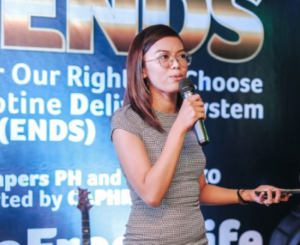
Tobacco harm reduction advocates have accused the Philippines Food and Drug Administration of violating the rights of Filipino vapers and consumers when the agency allegedly delivered lectures, instead of holding public consultations, on the draft guidelines for the regulation of e-cigarettes and heated tobacco products.
Clarisse Virgino, the Philippine representative to the Coalition of Asia Pacific Tobacco Harm Reduction Advocates or CAPHRA — a regional alliance of consumer tobacco harm reduction advocacy organizations, said the FDA held “moro-moro” hearings that ignored the inputs from stakeholders who will be directly affected by the draft guidelines.
The alleged “moro-moro” hearings came in the wake of allegations the FDA received foreign funding from anti-tobacco groups prompting the House leadership to call for an investigation on the agency’s potential conflict of interest and bias.
“We urge the FDA to listen to and respect the rights of 16 million Filipino smokers who deserve better alternatives to combustible cigarettes,” said Clarisse Virgino, the Philippine representative to the Coalition of Asia Pacific Tobacco Harm Reduction Advocates or CAPHRA—a regional alliance of consumer tobacco harm reduction advocacy organizations.
“The supposed consultations held by FDA on Oct. 6 and Oct. 8 on vapor products and heated tobacco products, respectively, turned out to be one-sided, pre-recorded lectures with cherry-picked questions that ignored the concerns of vapers, skipped scientific evidence, and violated the rights of consumers to be heard,” Virgino said in a statement.
Peter Paul Dator of Vapers PH said the FDA should have included the inputs from consumers and stakeholders who will be directly affected by the draft guidelines.
“All we ask for are transparency and inclusion in the discussion because we—the consumers—are the ones directly affected by these guidelines, and not the pharmaceutical or medical groups who have no stake in the issue. We hope that in the next dialogues, if there are any, the FDA officials will open their minds, listen to scientific evidence, and do their job of regulating, and not restricting the use of these novel products, as our existing laws intended,” Dator said.
Dator said the imposed limitations during the public consultation made it challenging to discuss extensively and thoroughly the crucial provisions of the proposed guidelines. “In coming up with a regulation that has the potential to positively change the lives of 16 million Filipino smokers, we, the stakeholders were expecting a more transparent and participatory process,” he said.
The FDA recently conducted two public hearings attended by some members of Congress as it prepares the guidelines for the regulation of vapor products and HTPs which the Royal College of Physicians, Public Health England and the National Academies of Science, Engineering and Medicine recognize as presenting reduced risks because they don’t employ the traditional cigarette combustion process that releases 7,000 chemicals.
On questioning from Nueva Ecija Rep. Estrellita Suansing, the FDA admitted it received money from international anti-tobacco groups The Union and Bloomberg Initiative raising concerns on the agency’s independence and potential conflict of interest.
Deputy Speaker and Ilocos Sur Rep. Deogracias Victor Savellano said he would file a House resolution calling for a full-blown congressional investigation.